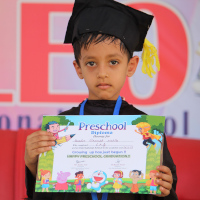Education is the foundation of human development and progress. It is an essential tool that empowers individuals, communities, and nations to achieve their goals and aspirations. The role of education goes beyond simply imparting knowledge and skills, as it also helps individuals to develop a sense of self-worth, critical thinking, and decision-making abilities. In this article, we will explore the significance of education, its benefits, and how it shapes our lives.
WHAT IS EDUCATION?

Education is the process of acquiring knowledge, skills, values, and beliefs through various methods, such as schooling, training, and life experiences. It is a lifelong process that starts from the early stages of childhood and continues throughout one's life. Education encompasses various domains, such as formal education (schooling), non-formal education (training), and informal education (life experiences).
THE BENEFITS OF EDUCATION

The benefits of education are countless. Education provides individuals with the skills and knowledge necessary to navigate the complexities of life successfully. It helps individuals to develop a sense of self-awareness, critical thinking, and problem-solving skills. Education also enables individuals to communicate effectively, make informed decisions, and adapt to changing circumstances.
THE ECONOMIC BENEFITS OF EDUCATION

Education is not only beneficial to individuals but also to the economy. It is an essential driver of economic growth and development. Educated individuals are more likely to secure higher-paying jobs, which contributes to the growth of the economy. Education also fosters innovation and entrepreneurship, which leads to the creation of new businesses, industries, and employment opportunities.
THE SOCIAL BENEFITS OF EDUCATION

Education is also vital for building strong, cohesive societies. Educated individuals are more likely to be engaged in their communities, participate in civic activities, and promote social cohesion. Education helps to break down social barriers and promotes equality by providing individuals with equal opportunities to succeed.
THE HEALTH BENEFITS OF EDUCATION

Education is also linked to better health outcomes. Educated individuals are more likely to make healthy lifestyle choices, such as eating a balanced diet, exercising regularly, and avoiding unhealthy behaviors. Education also helps individuals to access better healthcare, which leads to better health outcomes.
EDUCATION AND PERSONAL DEVELOPMENT

Education plays a critical role in personal development. It helps individuals to develop a sense of self-worth, confidence, and resilience. Education also helps individuals to develop their creativity, curiosity, and a love for lifelong learning. It provides individuals with the tools necessary to navigate life's challenges successfully and achieve their goals.
EDUCATION AND GLOBALIZATION

Education has become increasingly important in the context of globalization. In today's interconnected world, education is essential for individuals to compete in the global economy. Educated individuals are more likely to succeed in a globalized world, where cross-cultural communication and collaboration are becoming increasingly important.
THE ROLE OF TECHNOLOGY IN EDUCATION

Technology has transformed the way we learn and access education. It has made education more accessible, affordable, and convenient. Technology has also facilitated the development of new teaching methods, such as online learning, gamification, and personalized learning. Technology has the potential to revolutionize education and make it more engaging, effective, and accessible to all.
THE CHALLENGES OF EDUCATION

Despite the many benefits of education, there are still significant challenges that need to be addressed. One of the most significant challenges is the lack of access to education, particularly in developing countries. Other challenges include funding, quality, relevance, and equity.